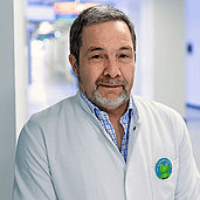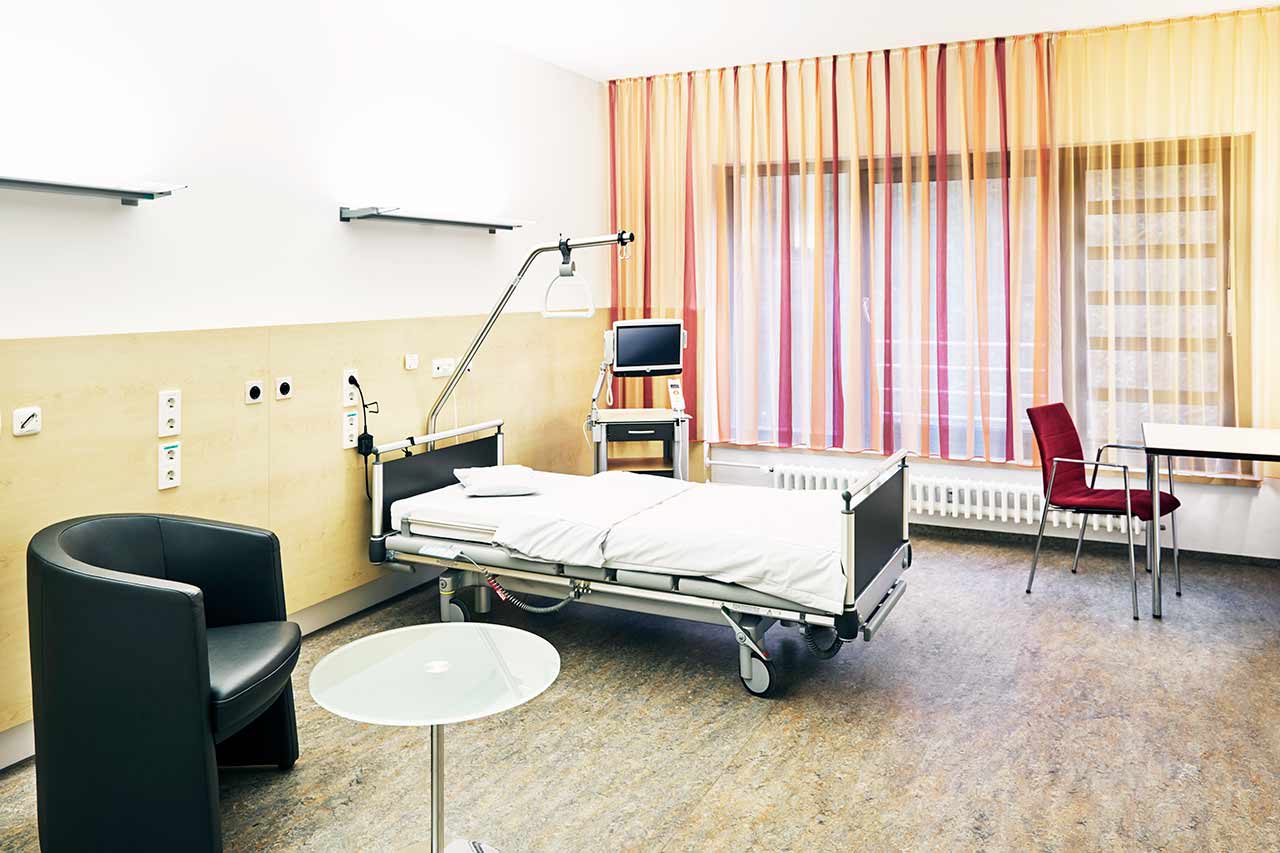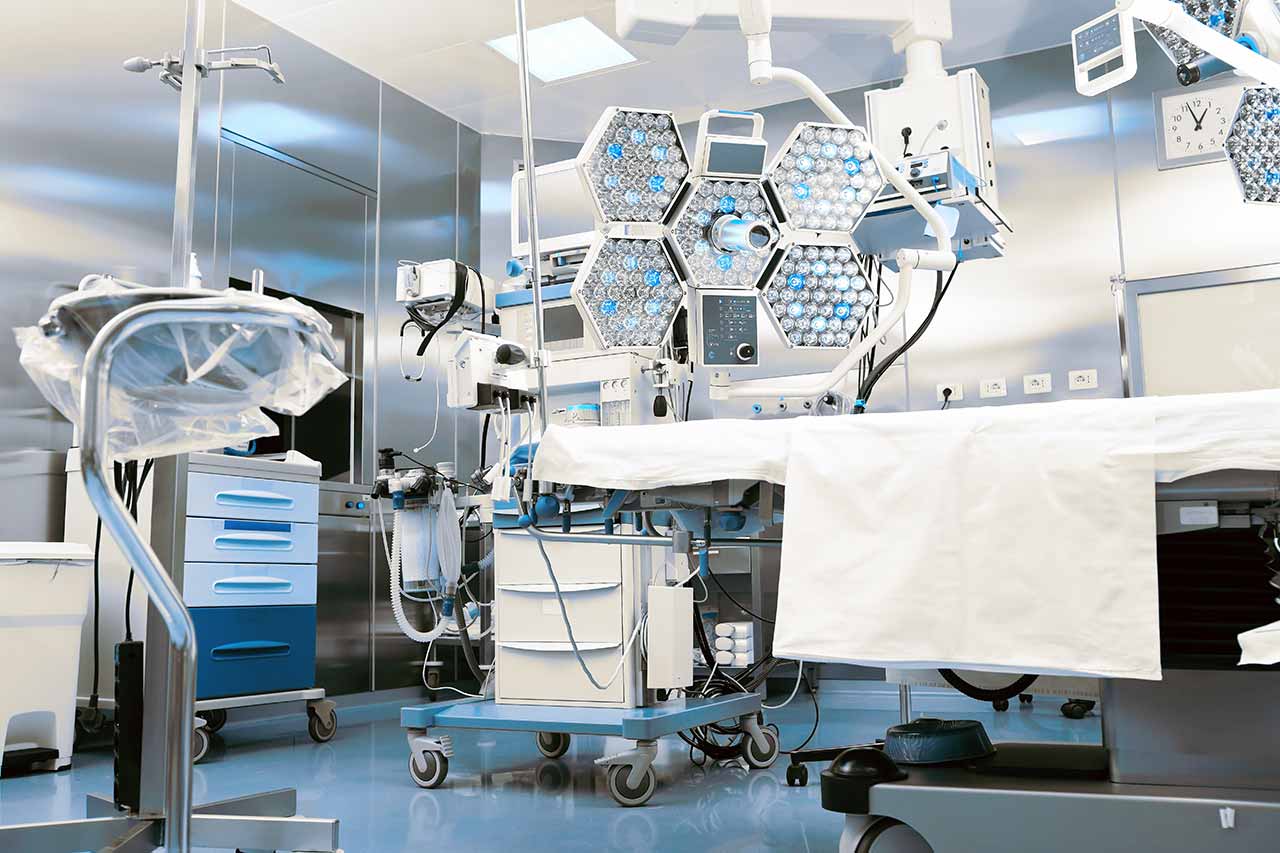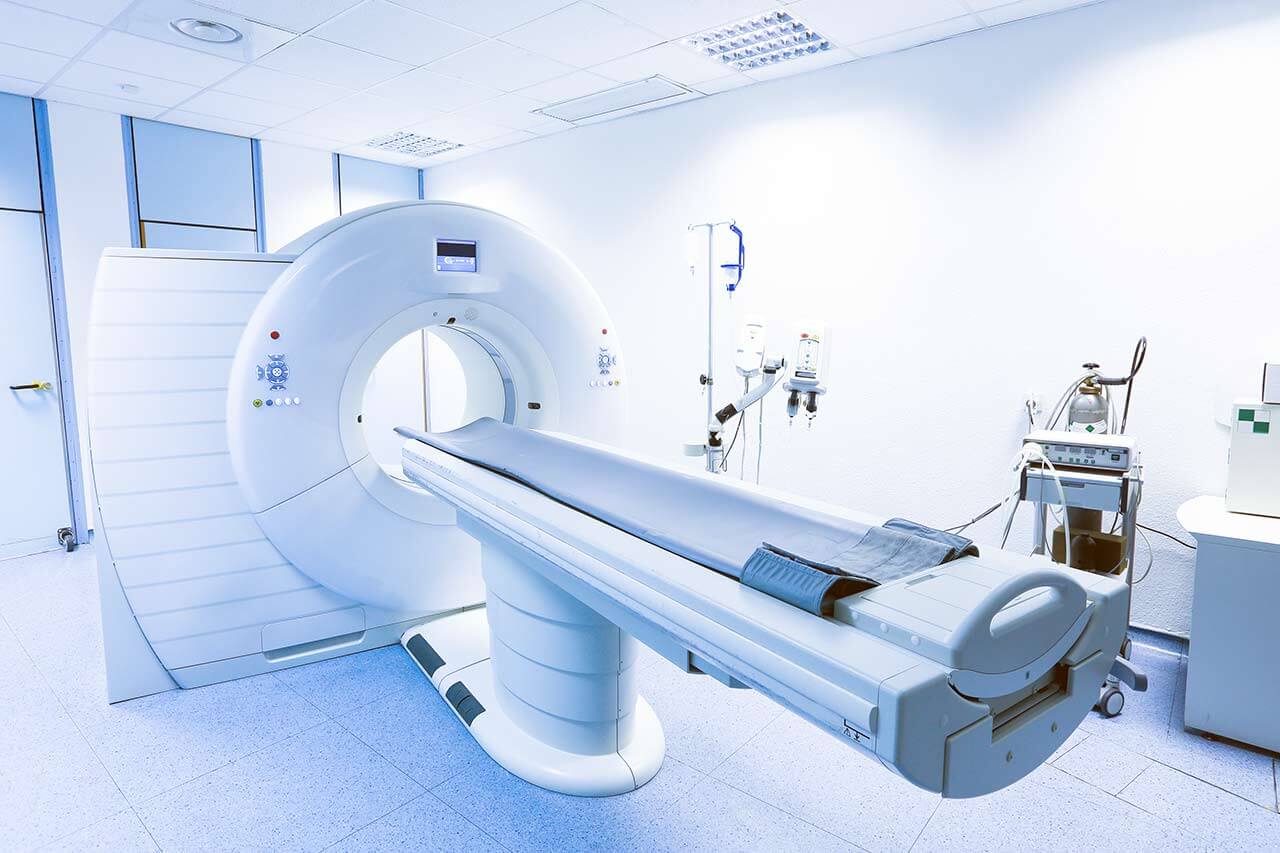
The program includes:
- Initial presentation in the clinic
- clinical history taking
- physical examination
- review of medical records
- laboratory tests:
- complete blood count
- general urine analysis
- biochemical analysis of blood
- TSH-basal, fT3, fT4
- tumor markers
- indicators of inflammation
- indicators blood coagulation
- CT/MRI of the abdomen and chest
- ultrasound/ X-ray examination
- conduct endosonography of bronchi
- bronchoscopy with biopsy of bronchi and lungs
- gistological/ cystological research
- preoperative care
- extended pneumonectomy
- histologically and immunohistochemically examination
of the remote tissues - symptomatic treatment
- control examinations
- the cost of essential medicines and materials
- nursing services
- full hospital accommodation
- explanation of future recommendations
Required documents
- Medical records
- MRI/CT scan (not older than 3 months)
- Biopsy results (if available)
Service
You may also book:
 BookingHealth Price from:
BookingHealth Price from:
About the department
The Department of Pediatric Surgery, Pediatric Orthopedics and Treatment of Severe Burn Injuries at the Hospital Kassel specializes in the full spectrum of surgical interventions in children, including in newborns. The highest professionalism of the department's surgeons allows them to successfully perform surgery even in premature newborns weighing 500 grams. The department's competence also includes high-quality conservative and surgical treatment of musculoskeletal diseases in children. The service range is complemented by the treatment of severe burns in children. Many surgical procedures are performed using sparing minimally invasive techniques, due to which the child does not need a long postoperative recovery, as well as severe pain syndrome is excluded. Depending on the complexity of the clinical case, the surgical procedures can be performed both on an inpatient and outpatient basis. The preoperative diagnostics is carried out using special equipment adapted to the needs of children and the characteristics of a growing body. An important role is played by the pleasant atmosphere in the department, which contributes to the speedy recovery of young patients. The department's doctors get along well with children and help them overcome their fear of the upcoming treatment. The department is headed by Dr. med. Franz Georg Schnekenburger.
Everyday, the highly qualified surgeons working in the department performs surgery to treat congenital anomalies, gastrointestinal diseases, urological diseases in boys, respiratory diseases and thoracic deformities, musculoskeletal diseases and injuries, as well as surgery to remove benign and malignant neoplasms. Whenever required, the specialists from related medical fields are involved in the therapeutic process. The surgeons perform surgery in young patients of various age groups – from premature babies to adolescents. They often use sparing minimally invasive techniques, which allow them to cure a child with a surgical disease without extensive skin incisions for surgical access. When performing such operations, the pediatric surgeon makes only a few small skin incisions from 0.5 to 1.5 cm. These incisions are used to insert special surgical instruments and a miniature camera that transmits the image of the operating field on a large screen. Minimally invasive surgery eliminates damage to healthy tissues, but at the same time it is as effective as classical open surgery.
One of the important fields of the department's clinical activities is the treatment of severe burn injuries in children. The department mostly admits children with hot liquid burns and fire burns. The department has a special Intensive Care Unit for emergency care to children with burns. The primary task of the department's specialists is to relieve pain and eliminate shock in a young patient. At the next stage of treatment, it is important to remove the affected skin areas as soon as possible and perform flap plastic surgery. When treating young patients, the department's specialists follow the current clinical protocols and recommendations of the German Society for Burn Treatment. It should be noted that the department cooperates closely with the main Severe Burn Injury Center in Hamburg, while the department's employees take an active part in the activities of the professional Working Group "Severe childhood burns". The department admits young patients from many cities in Germany providing them with highly effective treatment even in those cases, which seem hopeless, and therefore it has the status of one of the best highly specialized centers for the treatment of thermal burns in the country.
The department also pays special attention to the treatment of congenital and acquired musculoskeletal diseases in children. It specializes not only in surgery, but also in conservative therapy. After a comprehensive diagnostics and assessment of the condition of the musculoskeletal system, the orthopedic surgeons decide on the most appropriate treatment tactics. Surgery is the last-line treatment and is used only if the specialists are confident that conservative techniques will not be effective. The most common orthopedic disorders in children include hip dysplasia and hip dislocation, Perthes disease, O-shaped and X-shaped deformities of the lower limbs, foot deformities (for example, clubfoot, flat feet) and hand deformities (syndactyly and polydactyly). In the course of treatment, the doctors always take into account the age of the young patient and the characteristics of the growing organism.
The department’s range of medical services includes:
- Neonatal surgery and surgical correction of congenital malformations
- Surgery for congenital malformations of the esophagus, intestines and rectum
- Surgery for congenital functional disorders of the intestine (for example, Hirschsprung's disease)
- Surgery for severe inflammatory bowel disease
- Surgery for omphalocele and gastroschisis
- Surgery for diaphragmatic malformations
- Surgery for hypertrophic pyloric stenosis
- Surgery for congenital bile duct obstruction
- Surgery for spina bifida
- Surgery for hydrocephalus
- General pediatric surgery
- Surgery for neck cysts and fistulas
- Surgery for appendicitis
- Surgery for intussusception
- Surgery for intestinal obstruction
- Surgery for chronic constipation
- Surgery for gallstone disease
- Surgery for gastroesophageal reflux disease
- Pediatric urology
- Surgery for ureteral stricture
- Surgery for vesicoureteral reflux
- Surgery for hypospadias
- Surgery for congenital posterior urethral valves
- Surgery for malformations and diseases of the upper and lower urinary tract
- Endoscopic procedures in children
- Endoscopic examinations of the esophagus, stomach, duodenum
- Endoscopic examinations of the small bowel, colon and rectum
- Endoscopic examinations of the bladder and urethra
- Endoscopic examinations of the trachea and bronchi
- Pediatric thoracic surgery
- Surgery for pectus excavatum (Nuss procedure)
- Surgery for pectus carinatum
- Surgery for lung malformations
- Lung resection
- Pediatric plastic surgery
- Surgery for hand malformations (syndactyly and polydactyly)
- Surgery for everted ears
- Surgery for gynecomastia in boys
- Surgery for craniosynostosis
- Comprehensive treatment of severe burn injuries in children
- Pediatric traumatology
- Conservative and surgical treatment of bone fractures
- Conservative and surgical treatment of traumatic brain injuries, thoracic and abdominal injuries
- Pediatric orthopedics
- Treatment of congenital and acquired hip dislocation, hip dysplasia
- Treatment of Perthes disease
- Treatment of slipped capital femoral epiphysis
- Correction of O-shaped and X-shaped deformities of the lower limbs
- Correction of limb length difference
- Treatment of kneecap instability or knee cartilage defects
- Correction of congenital and acquired foot deformities (for example, clubfoot, flat feet, hallux valgus)
- Treatment of the consequences of neuromuscular diseases (for example, cerebral palsy, muscular dystrophy, etc.)
- Correction of musculoskeletal defects caused by injuries
- Tumor surgery
- Surgery to remove benign tumors
- Surgery to remove hemangiomas
- Surgery to remove lipoma
- Surgery to remove soft and bone tissue tumors
- Surgery to remove malignant tumors (in cooperation with the Department of Pediatric Oncology and Hematology)
- Wilms' tumor
- Neuroblastoma
- Teratoma
- Rhabdomyosarcoma
- Lung tumors
- Lymphoma
- Testicular tumors
- Laser procedures (Nd:YAG laser)
- Removal of hemangiomas
- Removal of lymphangiomas
- Removal of congenital posterior urethral valves
- Correction of esophageal stricture
- Minimally invasive surgery
- Surgery for abdominal diseases
- Appendix removal (appendectomy)
- Gallbladder removal (cholecystectomy)
- Surgery for gastroesophageal reflux disease
- Surgery for urologic diseases in boys
- Surgery for vesicoureteral reflux
- Surgery for thoracic diseases, including lung malformations
- Surgery for malformations of the chest wall (pectus excavatum and pectus carinatum)
- Outpatient surgery
- Surgery for inguinal hernias
- Surgery for undescended testes
- Surgery for phimosis (tight foreskin)
- Surgery for skin tumors
- Surgery for everted ears
- Surgery for bone fractures
- Other therapeutic options
Photo of the doctor: (c) Klinikum Kassel
About hospital
The Hospital Kassel is a progressive medical facility with a huge medical team, which provides high-quality medical services in all branches of modern medicine. The hospital is part of the regional medical Gesundheit Nordhessen Holding, which unites 5 top-class medical centers, including specialized rehabilitation clinics. With 1,281 beds, the hospital is known as the largest medical complex in the federal state of Hesse. The hospital has 32 specialized departments with highly qualified doctors and specially trained nursing staff in each department. The team of 3,200 employees takes care of the health of patients. The main value for each employee is the patient's health. The professional skills of the medical staff in combination with state-of-the-art medical and technical equipment of the hospital provide excellent opportunities for the treatment of patients with pathologies of any severity.
The hospital provides treatment to over 55,000 inpatients and about 140,000 outpatients every year. Medical care is provided to both German citizens and many patients from foreign countries. Such high rates are the evidence of excellent quality of medical services and the high credit of patients' trust.
The hospital has created a wonderful atmosphere, which contributes to the rapid recovery of patients. All diagnostic and therapeutic rooms, operating rooms, as well as patient rooms are designed taking into account modern standards of European medicine in order to ensure maximum comfort of each patient. All employees working in the hospital provide the patient with understanding and respect, as well as support him in every possible way during the entire therapeutic process.
The hospital successfully implements a quality management system. It uses its own quality management system implemented by the medical Gesundheit Nordhessen Holding, as well as the IQM (Initiative Qualitätsmedizin) monitoring system. As part of healthcare quality management, the hospital annually clearly provides reports on its clinical activities, the success of diagnostics, treatment, level of patient care, etc. Thus, the hospital stands for maximum openness in its work and makes every effort to maintain the highest level of quality of medical care.
Photo: (с) depositphotos
Accommodation in hospital
Patients rooms
The patients of the Hospital Kassel live in comfortable single, double and triple rooms. The patient rooms are made in a modern design and pastel colors. A standard patient room includes an automatically adjustable bed, a bedside table, a wardrobe, a table and chairs for receiving visitors, a TV and a telephone. The patient rooms have Wi-Fi. Each room has an ensuite bathroom with shower and toilet.
The hospital also offers enhanced-comfort patient rooms. Most of these rooms have a balcony. The bathroom additionally includes a hairdryer, towels and toiletries.
Meals and Menus
The patient and the accompanying person are offered tasty and balanced three meals a day. If for some reason you do not eat all foods, you will be offered an individual menu. Please inform the medical staff about your food preferences prior to treatment. The patients staying in enhanced-comfort rooms are provided with an individual menu every day.
The hospital also has several cafes where one can have a cup of tea or coffee, taste delicious pastries, salads, main hot dishes, pizza, etc.
Further details
Standard rooms include:
Religion
The religious services are available upon request.
Accompanying person
During the inpatient program, the accompanying person can live with the patient in a patient room or a hotel of his choice. Our managers will help you choose the most suitable option.
Hotel
During an outpatient program, the patient can stay at the hotel of his choice. Our managers will help you choose the most suitable option.





